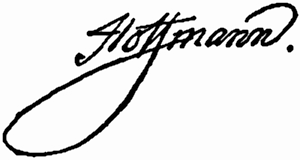Hoffmann as composer
The musical oeuvre comprises more than 30 stage works and about 50 instrumental and vocal works. The Symphony in E-flat Major, the Piano Sonatas, the Harp Quintet, the Piano Trio and the Miserere were recorded several times.
Hoffmann’s recognition as a composer came late. It is mainly based on his stage music (*performed in the same year):
1799: The mask (based on own libretto)
1801: Joke, cunning and revenge (singing opera after Johann W. Goethe)
1805: The funny musicians (singing opera after Clemens Brentano)* 1805: The Cross at the Baltic Sea (Stage music for a play by Zacharias Werner)
1807: Love and Jealousy (Opera after Calderón)
1808: The Potion of Immortality (based on a libretto by Julius Graf von Soden; sample for the office of conductor at the Bamberg Theatre)
1809: Dirna (melodrama after Julius von Soden)* 1809: Arlequin (ballet music)*
1811: Saul (melodrama of J. v. Seyfried)*)
1812: Aurora (Great heroic opera after Franz von Holbein)
1814: Undine. A magic opera in three acts (story and libretto by Friedrich Baron de la Motte Fouqué)
The idea for this opera originated in Bamberg. In 1816 it was successfully performed thirteen times in Berlin (until a fire in the opera house destroyed the full score). Stage design and costumes had been designed by C. F. Schinkel.
Today Undine is undisputedly regarded as the first romantic opera in German music history.
Maria von Weber dedicated enthusiastic criticism to the work:
„The work is one of the most spiritual that modern times have given us.“
